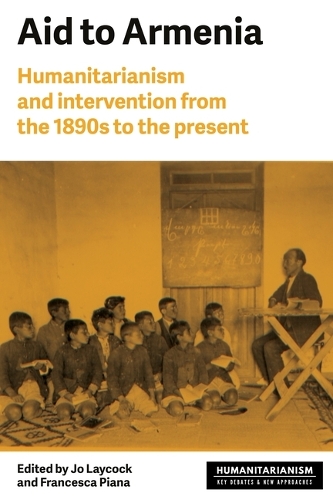
Aid to Armenia: Humanitarianism and Intervention from the 1890s to the Present
(Paperback)
Available Formats
Publishing Details
Aid to Armenia: Humanitarianism and Intervention from the 1890s to the Present
By (Author) Joanne Laycock
Edited by Francesca Piana
Manchester University Press
Manchester University Press
1st September 2024
United Kingdom
Classifications
General
Non Fiction
European history
Public international law: humanitarian law
361.26094756
Physical Properties
Paperback
216
Width 156mm, Height 234mm
Description
Interventions on behalf of Armenia and Armenians have come to be identified by scholars and practitioners alike as defining moments in the history of humanitarianism. This book reassesses these claims, critically examining a range of interventions by governments, international and diasporic organizations, and individuals that aimed to save Armenians.
Drawing on multidisciplinary perspectives, it traces the evolution of these interventions from the late-nineteenth century to the present day, paying particular attention to the aftermaths of the genocide and the upheavals of the post-Soviet period. The contributions connect diverse places (the Caucasus, Russia, the Middle East, Europe, North America, South America, and Australia) to reveal shifting transnational networks of aid and intervention.
Aid to Armenia explores this history, and engages critically with contemporary humanitarian questions facing Armenia, the South Caucasus region and the wider diaspora.
Reviews
'This is the 11th volume in the timely and consistently well-edited series Humanitarianism: Key Debates and New Approaches. Ten essays, an important introduction, an afterword, and an epilogue present and analyze over a century of humanitarian attempts to help Armenia and Armenians when they were ruled by Ottoman Turkey, Tsarist Russia, and the Soviet Union, or after independence. Some of the best essays are specific and focused, such as Sossie Kasbarians Refuge in the Homeland, about Syrian Armenians seeking shelter and humanitarian help due to the ongoing catastrophe in Syria. Others offer accounts of and draw lessons from countries contributing aid, as in Heitor Loureiros surprising narrative of attempts to engage Brazil. Vah Tachjians thoughtful account of contributions from a major philanthropic organization of the Armenian diaspora helpfully directs attention to non-state sources of assistance. Not all essays can be enumerated, but Asya Darbinyans rich and compact examination of Russian imperial responses to humanitarian catastrophe achieves a particularly complex task well, pointing out differences between assistance coming from first responders, institutions, and then states. The editors instructively summarize the wealth of actions and discourses that together constitute not just Armenian but all modern humanitarianism in this essential collection.'
CHOICE
Author Bio
Jo Laycock is a Senior Lecturer in Modern History at the University of Manchester
Francesca Piana is a Visiting Lecturer at the Global Studies Institute at the University of Geneva
